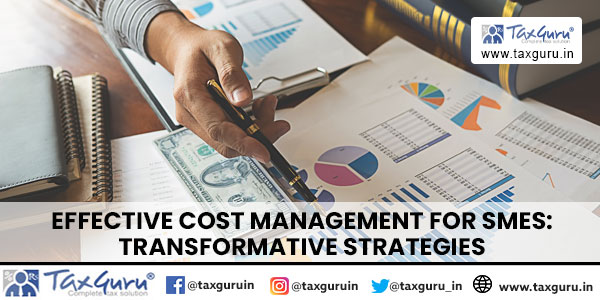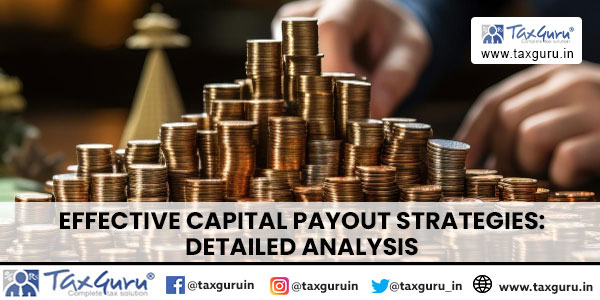“Good Thought” Vs. “Good Deed”
It is, almost 2 years, passed by since we have encountered the most historic and talked about Indirect Tax reform of the country. It is, undisputedly, a roller coaster and thrilling journey so far. Both the dealers and law makers kept learning continuously and recalibrating the business processes and lawsa at their ends. But it must be admitted without any debate that whenever any obstacle/dispute has arisen as far as the legal framework is concerned, the GST Council, CBIC and MoF have stepped in a lightning speed and initiated the corrective actions. Before I get into the issue in hand, on behalf of millions of GST Dealers, I would like to convey my gratitude to them for such a refreshed and expeditious approach in addressing the concerns of the trade and industry.
One of such taxpayer-friendly amendments brought into effect from 01.02.2019, is the proviso introduced to Section 17(5)(b) vide the Central GST (Amendment) Act, 2018; which reads as below:
“Provided that the input tax credit in respect of such goods or services or both shall be available, where it is obligatory for an employer to provide the same to its employees under any law for the time being in force”
Certainly, the objective of the said amendment is to allow GST Credit pertaining to expenses incurred by a dealer in the course or furtherance of his business but which otherwise were disallowed by virtue of Section 17(5)(b)(i) to 17(5)(b)(iii) of the said Act (negative list). Thus, with effect from 01.02.2019, input tax credit even in respect of goods or services or both falling under the said negative list shall be available, where it is obligatory for an employer to provide the same to its employees under any law for the time being in force. This is clearly evident from the “Notes on Clauses” to the Central Goods and Services Tax (Amendment) Bill, 2018 which clarifies:
“Clause 9 of the Bill seeks to amend section 17 of the principal Act relating to “Apportionment of credit and blocked credits”, in order to further expand the scope of eligibility of input tax credit.”
Though it does not have any binding effect under the law, but it may be worth to take note of the “Press Release” of the MoF dated 21.07.2018 (published at 8.22 pm by PIB Delhi) with regard to “Recommendations made during the 28th Meeting of the GST Council held in New Delhi on 21st July 2018 – Amendments to the CGST Act, 2017, IGST Act, 2017, UTGST Act 2017, and GST (Compensation to States) Act, 2017”. Serial No. 9 of the major recommendations as enumerated in the said Press Release has clarified that:
“Scope of input tax credit is being widened, and it would now be made available in respect of…. Goods or services which are obligatory for an employer to provide to its employees, under any law for the time being in force”
Now let us look at the Factories Act, 1948 (read with respective State Factories Rules), Section 46 of which casts a statutory obligation upon the occupier (employer) of a factory having more than 250 workers to provide a canteen (s). Further, drawing power from the Section 46(2) of the said Act, respective States have drawn Rules with regard to the foodstuffs to be served in such canteen and the charges which may be made therefor.
In view of the above, it is apparent that newly introduced proviso to Section 17(5)(b) of the CGST Act, 2017 should, inter alia, enable availment of input tax credit for goods and services procured for providing canteen facility to employees, where the employer is obligated to provide such canteen facility under any law for the time being in force.
Further, the aforementioned interpretation of the newly introduced proviso to Section 17(5)(b) has been reinforced by the Commentary on the CGST (Amendment) Act, 2018 published by the Ministry of Law and Justice, Legislative Department on 30.08.2018. In the page 15 of the said Commentary, while dealing with the amendments to Section 17, it has been clarified that
“ITC allowed in respect of food and beverages or both where the provision of such goods or services or both is obligatory for an employer to provide to its employees under any law for the time being in force.”
Reading upto this, one may jump to the conclusion that what is left there to discuss on this topic. But, “picture abhi baki haai mere dost”.
Entry No. 7(i) (read with Explanation 1 thereto) of Notification No. 11/2017- Central Tax (Rate) dated the 28.06.2017, as amended from time to time, specifically post amendment vide Notification No. 13/2018 –Central Tax (Rate) dated 26.07.2018, inter alia, specifies that supply, by way of or as part of any service, of goods, being food or any other article for human consumption or any drink, provided at a canteen of an industrial unit, will be subject to GST @ 5%, provided that credit of input tax charged on goods and services used in supplying the service has not been taken. The said Notification being a rate notification and not an exemption notification, does not appear to be optional to the dealer. This interpretation is also affirmed by the Karnataka Advanced Ruling Authority in the matter of Café Coffee Day (Advance Ruling No. KAR ADRG 21/2018 dated 21.08.2018). Such an interpretation is certainly, contradictory to the objective of introducing the proviso to Section 17(5)(b) of the CGST Act, 2017, vide the Amendment Act of 2018.
Therefore, if we read the amended Section 17(5) of the CGST Act, 2017 together with the rate notification No.11/2017 – Central Tax (Rate) as amended by Notification No. 13/2018 – Central Tax (Rate), we are having a peculiar and interesting proposition:
| Where an employer decides to recover some amount from employees towards foods provided in the canteen i.e. if there is an outward supply in the hands of the employer, certainly the aforesaid rate notification will become applicable and then as per the conditions laid down in the said notification, the employer does not have any choice but to apply GST @5% on such recovery and forego the corresponding credit | Where an employer decides not to recover any amount from employees towards foods provided in the canteen i.e. when there is no outward supply in the hands of the employer, certainly the aforesaid rate notification along with conditions laid down therein will not have any applicability and as a result the employer can avail the corresponding credit by virtue of the aforesaid proviso introduced to Section 17(5)(b) w.e.f 01.02.2019. |
From the above, it is clearly transpiring that there is a gap between the intention of the law and what is imprinted in black and white. Unfortunately, while interpreting any fiscal law, the later decides the final words.
Hence, in the interest to ensure the actual intention of the law and to avoid any unwarranted legal disputes, it is recommended that the aforesaid rate Notification No. 11/2017- Central Tax (Rate) dated the 28.06.2017 be amended or a corrigendum issued to the effect that:
(i) The proviso in Column 5 in the Table against serial number 7(i), in column (3) of the said Notification (as amended upto date) is not applicable for supply of food / drink at an industrial canteen for employees, where the employer is obligated to provide such canteen facility under any law for the time being in force; OR
(ii) GST at a rate higher than 5% may be levied for supply of food / drink at an industrial canteen for employees, where the employer is obligated to provide such canteen facility under any law for the time being in force and where the employer wants to avail the credit of input tax charged on goods and services used in supplying the service.
Note:
(1) It is assumed that use of “:” after Section 17(5)(b)(iii) is an inadvertent typographical error which ideally should have been “;”. Otherwise the newly introduced proviso has to be read only in conjunction with Section 17(5)(b)(iii) and not the entire Section 17(5)(b). Now, the items mentioned under Section 17(5)(b)(iii) i.e. travel benefits extended to employees on vacation such as leave or home travel concession, to the best of the knowledge of the writer cannot fall under the category of a statutory obligation of the employer to its employees under any existing law. Thus, going by the golden rule of interpretation the literal interpretation suffers from the absurdity and hence, should be interpreted in a wider sense.
(2) Wherever the provisions under the Central GST Act, 2017 or CGST Act, 2017 are quoted the same has to be read in conjunction with the corresponding provisions of the State GST Act(s) or the Union Territory GST Act.























Hi, can input credit for canteen expenses provided in factory without any recoveries from employee be claimed from retrospective effect or is it applicable from 01.02.2019
In my view, on the recovery made from the employees for the foods provided from the canteen you will have to consider the GST liability. The Kerala Appellate Authority of Advance Ruling in Order No. CT/7726/2018-C3, Dated 25th September, 2018, in the matter of M/s. Caltech Polymers Pvt.Ltd. has affirmed this position as well.
As far as credit availability is concerned, as explained in the article, in view of the condition prescribed under the Notification No. 11/2017 – Central Tax (Rate) as amended by the Notification 13/2018 –Central Tax (Rate), you can not avail the GST credit towards the services procured from the canteen operator.
We have third party canteen contractor in our factory. food is prepared by him in side factory. we have fixed rates for Lunch etc. We also recover partial nominal amount from employees. Canteen contractor is charging 5% ( 2.5+2.5%) GST in his invoice. Shall we eligable to take credit for this 5%. whether we need to pay GST on recovery part ? Please provide detail as per Law.